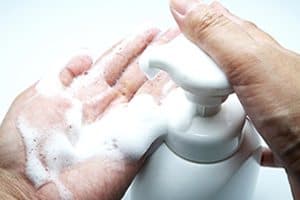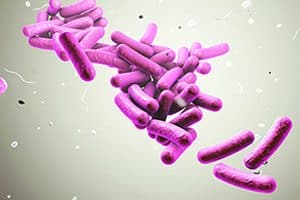
Potential negative effects on consumers’ health To date, there is not sufficient scientific evidence to show that over-the-counter (OTC) antibacterial soaps are better at preventing illness than washing with plain soap and water, according to the U.S. Food and Drug Administration (FDA). The widespread use of these products over a long period of time has […]

Potential negative effects on consumers’ health To date, there is not sufficient scientific evidence to show that over-the-counter (OTC) antibacterial soaps are better at preventing illness than washing with plain soap and water, according to the U.S. Food and Drug Administration (FDA). The widespread use of these products over a long period of time has raised concern for potential negative effects on consumers’ health.
After examining the issue, in 2013 the FDA issued a proposed rule requiring safety and efficacy data from manufacturers, as well as consumers if the products were to continue to be marketed as antibacterial products. In January 2017, the FDA announced a final rule in which OTC consumer products, including liquid, foam, gel hand soaps, bar soaps, and body washes, containing the most antibacterial active ingredients, including triclosan and triclocarban, was no longer to be marketed.
Antibacterial soaps and cleansers are made to kill bacteria that is harmful for your body before it reaches unsafe levels. However, these antibacterial products also kill the good bacteria that can help prevent other bacteria from spreading and that helps build a natural resistance to harmful bacteria. Many antibacterial product manufacturers use the killing of 99.9 percent of germs as a primary selling feature, but this is deceiving as some of those germs help strengthen the immune system.
National law firm Parker Waichman LLP has extensive experience and success in representing clients in product liability litigation. Attorneys at the firm are available to answer questions for any individuals seeking legal information for a potential lawsuit.
 Recent research concerning the effect of antibacterial soaps and cleansers show some disturbing links to new superbugs. A report authored by 200 different scientists has claimed that antibacterial chemicals are doing “more harm than good.” When antibacterial products strip away all germs, natural resistance to new germs does not happen. Many experts believe antibacterial products create a climate for new types of bacteria to emerge that are resistant to some medications, especially antibiotics.
Recent research concerning the effect of antibacterial soaps and cleansers show some disturbing links to new superbugs. A report authored by 200 different scientists has claimed that antibacterial chemicals are doing “more harm than good.” When antibacterial products strip away all germs, natural resistance to new germs does not happen. Many experts believe antibacterial products create a climate for new types of bacteria to emerge that are resistant to some medications, especially antibiotics.
Studies have also been done to review the effect antibacterial products have on hormones. The tests done on animals have some alarming results. The disruption that triclosan has on animals affects estrogen, testosterone, and thyroid levels. Triclosan, an ingredient in many antibacterial products, has been proven to be an endocrine disruptor. The endocrine system is a system of ductless glands and other structures that produce secretions (hormones) that are released directly into the circulatory system, influencing metabolism and other body processes. Experts believe women and children are most at risk for potential hormone imbalances caused by antibacterial products.
Triclosan alters hormone activity in the body, which negatively impacts a child’s development, a woman’s menstrual cycle, or a mother’s ability to produce quality breast milk, reports Natural News. Rolf Halden, professor of engineering at Arizona State University said, “Environmental and human exposures to triclosan and triclocarban are widespread, affecting pregnant women, developing fetuses, and breast-feeding babies.”
Dr. Barbara Sattler, environmental health professor at the University of San Francisco, said, “People think antimicrobial hand soaps offer better protection against illness, but generally, antimicrobial soaps perform no better than plain soap and water.”
Dr. Jane Woodcock, director of the FDA’s center for evaluation and research said, “Consumers may think antibacterial washes are more effective at preventing the spread of germs, but we have no scientific evidence that they are any better than plain soap and water. In fact, some data suggests that antibacterial ingredients may do more harm than good over the long term.”
The U.S. banned triclosan from soap in 2016, but substitute chemicals are anticipated to pose similar problems. “I was happy that the FDA finally acted to remove these chemicals from soaps,” said Dr. Arlene Blum, executive director of the Green Science Policy Institute. “But I was dismayed to discover at my local drugstore that most products now contain substitutes that may be worse,” Dr. Blum said. “It doesn’t help that these chemicals are pervasive and found in all sorts of products, including food storage containers, school supplies, paints, exercise mats, electronics, kitchenware, flooring, clothes, home textiles, and countertops.”
Scientists note that antimicrobials are difficult to avoid because they are found in 2,000 products including paints, soaps, detergents, and toothpastes. The American Chemical Society (ACS) said that at the very least, the findings are alerting policymakers and increasing pressure on companies to remanufacture their products for the safety of the consumer.
If you or someone you know has been injured by chemicals in consumer products, you may have valuable legal rights. Parker Waichman LLP offers free, no-obligation case evaluations. We urge you to contact us at 1-800-YOURLAWYER (1-800-968-7529).


